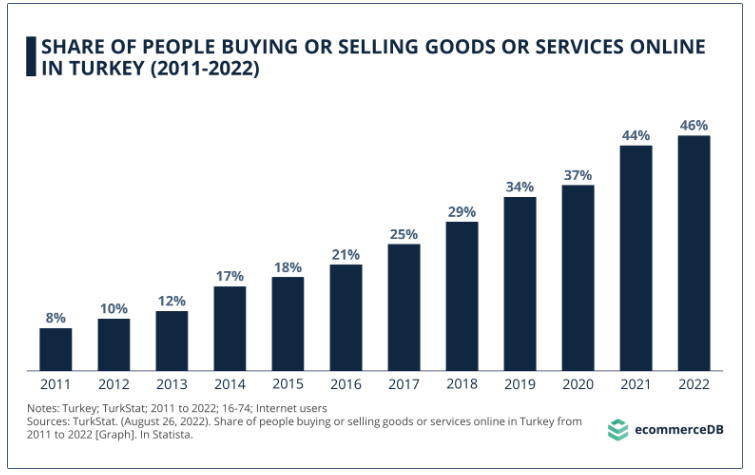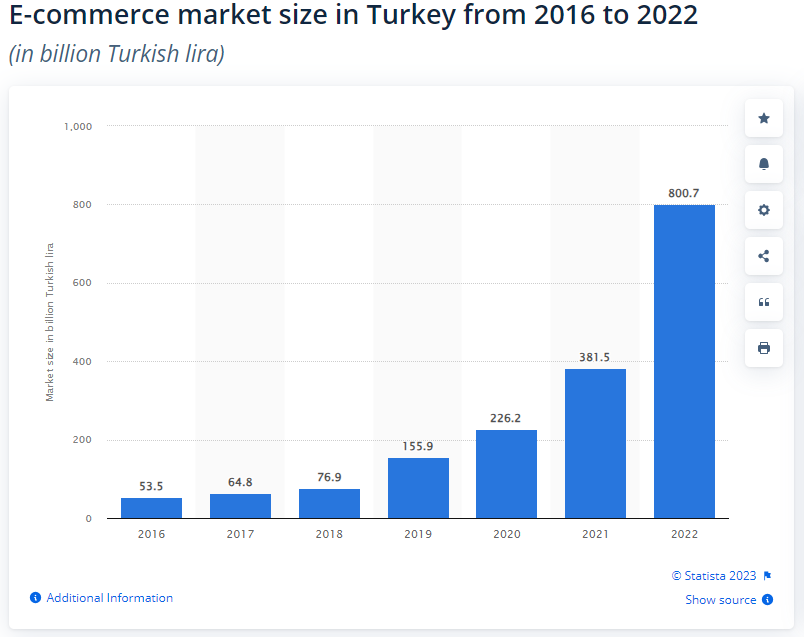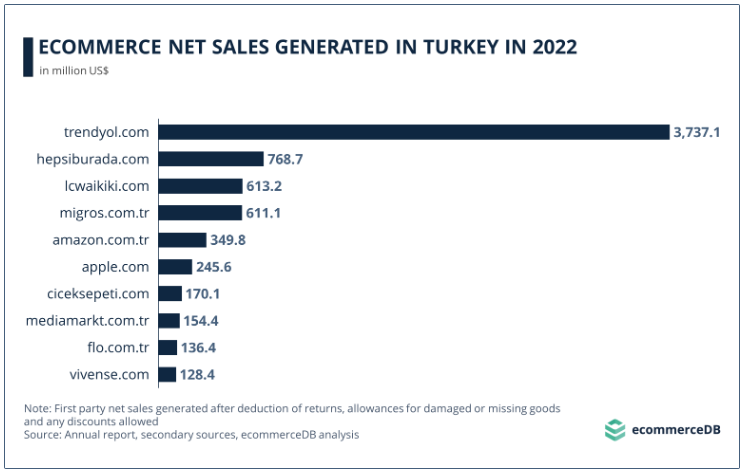Ecommerce in Turkey
Turkey is located in both Europe and Asia. Compared to other countries, Turkey is in the middle ground in terms of ecommerce. With a young population, growing economy and increasing ecommerce penetration, it is seen as a promising market.
|
COUNTRY STATISTICS
|
TURKEY
|
|---|---|
| Population | 85.82 million (2023) |
| Internet users (% of population) | 83% |
| Online sales | €53 billion (2023) |
| Online stores worth mentioning: | Trendyol, Hepsiburada, Icwaikiki |
Content:
- Ecommerce customers in Turkey
- The ecommerce market in Turkey
- Big online stores in Turkey
- Latest ecommerce news from or about Turkey
Ecommerce customers in Turkey
Turkey has an internet penetration rate of 83 percent. In 2022, half of internet users in Turkey partake in ecommerce. The Turkish market for selling and buying goods and services online was one of the fastest-growing markets globally.
The Turkish population is among the youngest in Europe.
Notably, the Turkish population is among the youngest in Europe: half of the population is younger than 30 years old. Therefore it is no surprise that most Turkish shoppers use their mobile phone. In 2023, 91 percent of transactions on online platforms were completed on mobiles.
Top product categories in Turkey by ecommerce volume (2023):
- White goods and small household appliances (233 billion Turkish lira)
- Electronics and media (135 billion Turkish lira)
- Clothing, shoes and accessories (127 billion Turkish lira)
These product categories contrast with the largest markets in Europe, reflecting different consumer preferences. While white goods and small household appliances dominate the ecommerce scene in Turkey, fashion is the prevailing sector in other European markets such as the UK, Germany, France, and Italy.
Looking for ecommerce software to start selling in Europe? Webador and Shopify are platforms that are well optimized for cross-border ecommerce.
Payment methods in Turkey
For payment, debit credit cards are the most popular method in online stores in Turkey: they represent nearly 60 percent of payments according to payment provider Pay. Also cash is still popular, even in ecommerce. In 2023, cash on delivery makes up 7 percent of transactions. Bank transfers account for approximately 11 percent of online payments. Digital wallets represent roughly 11 percent of all online transactions.

The ecommerce market in Turkey
In recent years, a stronger online shopping culture has emerged in Turkey. Even though Turkey is dealing with inflation, ecommerce transactions have increased. The country has a strategic position near areas like Europe, the Middle East, and Central Asia. Besides that, it is catching up with digital trends.
Turkey is catching up with digital trends.
According to research by the Turkish Ministry of Commerce, the amount of online transactions grew 22.3 percent between 2022 and 2023. The total number of online transactions was 5.87 billion. This is a significant growth, especially compared to other European ecommerce markets, which hardly increased in 2023.
Up until 2021, the online share in Turkey had experienced a gradual increase since 2017. The increase in 2020 was particularly significant (reaching 6.7 percent), likely influenced by the Covid-19 pandemic, which boosted online shopping. Following a brief rise to 7.4 percent in 2021, the online share dipped to 5.9 percent in 2022.

Do you want to sell cross-border in Europe? It ain't easy but with the right ecommerce software, online marketing channels and European fulfillment companies market leadership is surely possible.
Leading online stores in Turkey
The Turkish ecommerce market seems to be dominated by online marketplaces, multi-category retailers and private shopping sites. Popular online stores in Turkey are Trendyol, Hepsiburada and lcwaikiki.

Latest news about Turkey
Read all our articles about ecommerce in Turkey.

